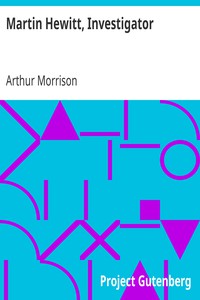Martin Hewitt, Investigator, Arthur Morrison [i like reading txt] 📗

- Author: Arthur Morrison
Book online «Martin Hewitt, Investigator, Arthur Morrison [i like reading txt] 📗». Author Arthur Morrison
"You are quite sure, are you, that everything was there except the key?" Hewitt asked.
"Certin, sor? Well, I got along to me room, sick an' sorry enough, an' doubtsome whether I might get in wid no key. But there was the key in the open door, an', by this an' that, all the shtuff in the room—chair, table, bed, an' all—was shtandin' on their heads twisty-ways, an' the bedclothes an' every thin' else; such a disgraceful stramash av conglomerated thruck as ye niver dhreamt av. The chist av drawers was lyin' on uts face, wid all the dhrawers out an' emptied on the flure. 'Twas as though an arrmy had been lootin', sor!"
"But still nothing was gone?"
"Nothin', so far as I investigated, sor. But I didn't shtay. I came out to spake to the polis, an' two av them laffed at me—wan afther another!"
"It has certainly been no laughing matter for you. Now, tell me—have you anything in your possession—documents, or valuables, or anything—that any other person, to your knowledge, is anxious to get hold of!"
"I have not, sor—divil a document! As to valuables, thim an' me is the cowldest av sthrangers."
"Just call to mind, now, the face of the man who tried to put powder in your drink, and that of the doctor who attended to you in the railway station. Were they at all alike, or was either like anybody you have seen before?"
Leamy puckered his forehead and thought.
"Faith," he said presently, "they were a bit alike, though one had a beard an' the udther whiskers only."
"Neither happened to look like Mr. Hollams, for instance?"
Leamy started. "Begob, but they did! They'd ha' been mortal like him if they'd been shaved." Then, after a pause, he suddenly added: "Holy saints! is ut the fam'ly he talked av?"
Hewitt laughed. "Perhaps it is," he said. "Now, as to the man who sent you with the bag. Was it an old bag?"
"Bran' cracklin' new—a brown leather bag."
"Locked?"
"That I niver thried, sor. It was not my consarn."
"True. Now, as to this Mr. W. himself." Hewitt had been rummaging for some few minutes in a portfolio, and finally produced a photograph, and held it before the Irishman's eye. "Is that like him?" he asked.
"Shure it's the man himself! Is he a friend av yours, sor?"
"No, he's not exactly a friend of mine," Hewitt answered, with a grim chuckle. "I fancy he's one of that very respectable family you heard about at Mr. Hollams'. Come along with me now to Chelsea, and see if you can point out that house in Gold Street. I'll send for a cab."
He made for the outer office, and I went with him.
"What is all this, Hewitt?" I asked. "A gang of thieves with stolen property?"
Hewitt looked in my face and replied: "It's the Quinton ruby!"
"What! The ruby? Shall you take the case up, then?"
"I shall. It is no longer a speculation."
"Then do you expect to find it at Hollams' house in Chelsea?" I asked.
"No, I don't, because it isn't there—else why are they trying to get it from this unlucky Irishman? There has been bad faith in Hollams' gang, I expect, and Hollams has missed the ruby and suspects Leamy of having taken it from the bag."
"Then who is this Mr. W. whose portrait you have in your possession?"
"See here!" Hewitt turned over a small pile of recent newspapers and selected one, pointing at a particular paragraph. "I kept that in my mind, because to me it seemed to be the most likely arrest of the lot," he said.
It was an evening paper of the previous Thursday, and the paragraph was a very short one, thus:
"The man Wilks, who was arrested at Euston Station yesterday, in connection with the robbery of Lady Quinton's jewels, has been released, nothing being found to incriminate him."
"How does that strike you?" asked Hewitt. "Wilks is a man well known to the police—one of the most accomplished burglars in this country, in fact. I have had no dealings with him as yet, but I found means, some time ago, to add his portrait to my little collection, in case I might want it, and to-day it has been quite useful."
The thing was plain now. Wilks must have been bringing his booty to town, and calculated on getting out at Chalk Farm and thus eluding the watch which he doubtless felt pretty sure would be kept (by telegraphic instruction) at Euston for suspicious characters arriving from the direction of Radcot. His transaction with Leamy was his only possible expedient to save himself from being hopelessly taken with the swag in his possession. The paragraph told me why Leamy had waited in vain for "Mr. W." in the cab.
"What shall you do now?" I asked.
"I shall go to the Gold Street house and find out what I can as soon as this cab turns up."
There seemed a possibility of some excitement in the adventure, so I asked: "Will you want any help?"
Hewitt smiled. "I think I can get through it alone," he said.
"Then may I come to look on?" I said. "Of course I don't want to be in your way, and the result of the business, whatever it is, will be to your credit alone. But I am curious."
"Come, then, by all means. The cab will be a four-wheeler, and there will be plenty of room."
Gold Street was a short street of private houses of very fair size and of a half-vanished pretension to gentility. We drove slowly through, and Leamy had no difficulty in pointing out the house wherein he had been paid five pounds for carrying a bag. At the end the cab turned the corner and stopped, while Hewitt wrote a short note to an official of Scotland Yard.
"Take this note," he instructed Leamy, "to Scotland Yard in the cab, and then go home. I will pay the cabman now."
"I will, sor. An' will I be protected?"
"Oh, yes! Stay at home for the rest of the day, and I expect you'll be left alone in future. Perhaps I shall have something to tell you in a day or two; if I do, I'll send. Good-by."
The cab rolled off, and Hewitt and I strolled back along Gold Street. "I think," Hewitt said, "we will drop in on Mr. Hollams for a few minutes while we can. In a few hours I expect the police will have him, and his house, too, if they attend promptly to my note."
"Have you ever seen him?"
"Not to my knowledge, though I may know him by some other name. Wilks I know by sight, though he doesn't know me."
"What shall we say?"
"That will depend on circumstances. I may not get my cue till the door opens, or even till later. At worst, I can easily apply for a reference as to Leamy, who, you remember, is looking for work."
But we were destined not to make Mr. Hollams' acquaintance, after all. As we approached the house a great uproar was heard from the lower part giving on to the area, and suddenly a man, hatless, and with a sleeve of his coat nearly torn away burst through the door and up the area steps, pursued by two others. I had barely time to observe that one of the pursuers carried a revolver, and that both hesitated and retired on seeing that several people were about the street, when Hewitt, gripping my arm and exclaiming: "That's our man!" started at a run after the fugitive.
We turned the next corner and saw the man thirty yards before us, walking, and pulling up his sleeve at the shoulder, so as to conceal the rent. Plainly he felt safe from further molestation.
"That's Sim Wilks," Hewitt explained, as we followed, "the 'juce of a foine jintleman' who got Leamy to carry his bag, and the man who knows where the Quinton ruby is, unless I am more than usually mistaken. Don't stare after him, in case he looks round. Presently, when we get into the busier streets, I shall have a little chat with him."
But for some time the man kept to the back streets. In time, however, he emerged into the Buckingham Palace Road, and we saw him stop and look at a hat-shop. But after a general look over the window and a glance in at the door he went on.
"Good sign!" observed Hewitt; "got no money with him—makes it easier for us."
In a little while Wilks approached a small crowd gathered about a woman fiddler. Hewitt touched my arm, and a few quick steps took us past our man and to the opposite side of the crowd. When Wilks emerged, he met us coming in the opposite direction.
"What, Sim!" burst out Hewitt with apparent delight. "I haven't piped your mug[A] for a stretch;[B] I thought you'd fell.[C] Where's your cady?"[D]
A [Seen your face.]
B [A year.]
C [Been imprisoned.]
D [Hat.]
Wilks looked astonished and suspicious. "I don't know





Comments (0)